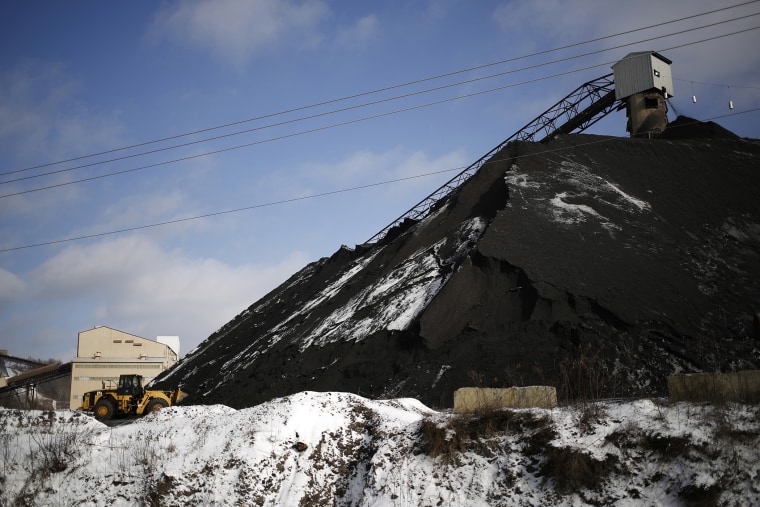Flip a switch and there’s a good chance you’re burning it: coal.
The shiny black rock produces 40 percent of the country's electricity, overall, and more than 90 percent of the power in states like Kentucky and West Virginia. It’s also a political symbol of traditional work and masculine virtue, a source of community pride in huge parts of Appalachia and the Mountain West.
But it comes at a cost: Coal is the single biggest source of global warming pollution, which is likely to have made 2015 the hottest year in recorded history. And that’s why the Obama administration’s decision on Friday to stop new coal mining on federal land is such a big deal.
It adds momentum to an activist-launched, suddenly-mainstream push to "keep it in the ground." The campaign aims to leave as much as 80 percent of coal reserves unburned, a goal that would remake the way America is powered and, according to scientists, avoid the worst effects of global warming. But Friday's move could also set off a fresh political war that undermines Obama's legacy-making effort to "help the planet to heal."
The president, who first previewed the announcement in his State of the Union address on Wednesday, is expected to defend his decision in a YouTube interview later Friday.
“Rather than subsidize the past, we should invest in the future,” Obama told a joint session of Congress. “That’s why I’m going to push to change the way we manage our oil and coal resources, so that they better reflect the costs they impose on taxpayers and our planet.”
RELATED: Obama goes big on climate change
This isn’t a ban and it won’t on its own shut down any coal plants. But it stops coal companies from leasing new land, sends an ominous message to a market already in free fall, and puts the next administration in a powerful position to curb global warming.
The first step is a “comprehensive review” of the federal coal program, which includes the source of power for about one in every five light switches in America. This alone is historic – the first review in more than three decades – and in a press release the Interior Department pledged to consider coal’s “impacts on the environment.”
If federal researchers conclude that companies need to pay more to pull coal from federal land, the next administration could raise the price of a lease, undercutting the economic case for burning coal in the first place. That’s already the goal of Obama’s Clean Power Plan, which places the first limits on the amount of carbon pollution that power plants can spew into the atmosphere.
If it survives legal and congressional challenges, the Clean Power Plan is expected to shutter hundreds of existing coal-fired power plants, prevent construction of new ones and boost renewable energy to heights not previously seen. But every Republican presidential candidate has pledged to repeal the Clean Power Plan, and Republican Speaker of the House Paul Ryan set the tone for a fresh attack on President Obama’s latest “war on coal.”
“The president’s policies have already ravaged coal country, destroying jobs and people’s way of life, and this will increase that suffering,” Ryan said in a statement. “Congress will continue to fight back against the president’s ruthless pursuit of destroying people’s low-cost energy sources in order to cement his own climate legacy."
On the Democratic side, Obama’s news could force front-runner Hillary Clinton into an even more progressive approach to climate policy. She’s already pledged to uphold and even deepen the president’s efforts, maintaining America’s leadership role in last month’s Paris Agreement. That deal commits every country on Earth to cut carbon emissions.
But in the past, the former secretary of state has hesitated to address fossil fuel extraction on public. At her first New Hampshire town hall appearance last July, a young woman asked whether Clinton would ban fossil fuel extraction on public lands. Clinton said no: “The answer is not until we’ve got the alternatives in place. That may not be a satisfactory answer to you but I think I have to take the responsible answer.”
A second young woman stood up, and said she was “disappointed” in the first answer. She wondered if Clinton’s “refusal to take leadership on climate change” was because of big campaign donations from the fossil fuel industry.
RELATED: Climate deal: The good, the bad, the still unknown
“No. No, it is not,” Clinton said, adding that the feel good response — “you bet I will ban extraction on public lands” — would have also been a reckless one. “We still have to run our economy, we still have to turn on the lights.”
Clinton’s main rival for the Democratic nomination Bernie Sanders already believes we can kill off drilling and mining on public land and keep the economy humming. Back in November, the Vermont senator, along with Oregon Sen. Jeff Merkley, floated a bill that would block new leases for all fossil fuels on federal land and end offshore drilling in every body of water America controls.
“I can’t speak to Hillary Clinton, but I would hope that Hillary Clinton would join Jeff Merkley and myself on this issue,” Sanders said at the time. "The point is here on federal land, in my view, in Sen. Merkley’s view, we should not be in the future extracting oil and coal and gas from that land. At the same time as we are trying to combat climate change -- it just makes no sense at all.”
